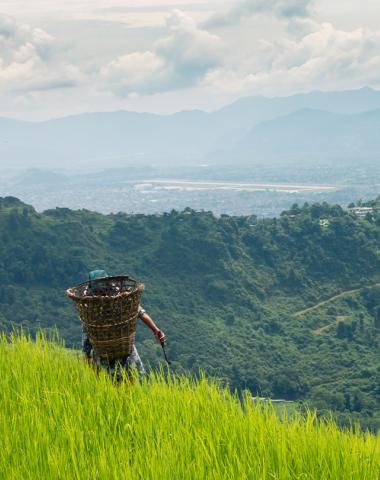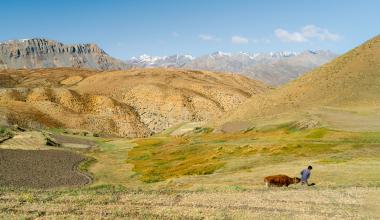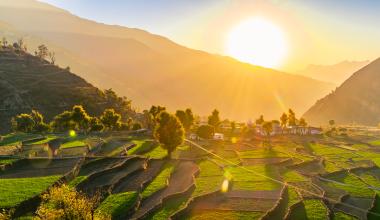Multi-stakeholder processes and stakeholder empowerment in the Himalayan Region focused on the development and implementation of comprehensive roadmaps for agroecological food systems in Bhutan, India and Nepal.
The Himalayan Agroecology Initiative is a strategic endeavour that works closely with governments and with the support of a broad group of stakeholders, to support the emergence of multi-stakeholder processes that develop, build capacities and facilitate the implementation of agroecology roadmaps. Its main aim is to improve livelihoods and sustainability, and to empower farmers, farmer producer organizations and other key stakeholders so they better benefit of public policies, including those that support organic and natural agriculture, food processing and consumption. A high-level conference launching the roadmaps is envisioned to be held in 2025 in New Delhi, India.
Whilst the World Future Council and IFOAM – Organics International together serve as global coordinators of the Himalayan Agroecology Initiative, renowned organisations are paving the way for this ambitious undertaking at the national level, including the Alliance of Bioversity International-CIAT and the United Nations Development Programme (UNDP) in India, Local Initiatives for Biodiversity, Research and Development (LI-BIRD) in Nepal and the Tarayana Foundation in Bhutan. This timely effort contributes to the German-Indian Lighthouse Initiative for Agroecology and Sustainable Resource Management and is funded by the Special Initiative Transformation of Agricultural and Food Systems of the Federal Ministry for Economic Cooperation and Development (BMZ) and the International Fund for Agricultural Development (IFAD), which both are core partners.
Stepping up Systems Thinking and Action
Our world’s food and farming systems currently face multiple challenges ranging from natural resource depletion, climate change, chemical pollution and biodiversity loss to farmers and food workers not earning a decent income, leading to hunger, malnutrition, ill-health, migration and much more. The way we produce, process, distribute, market, consume or waste food can either alleviate or exacerbate these conditions.
"Addressing these problems requires integrated actions taken by all stakeholders at local, national, regional, and global levels, by both public and private actors, and across multiple fronts - not only in agriculture, but also in trade policy, health, environment, gender norms, education, transport and infrastructure”
Food and Agriculture Organisation of the United Nations (FAO).
Agroecology is an internationally recognised transition pathway towards sustainable food systems, as evidenced by the Agroecology Coalition founded in 2021, which comprises more than 50 countries (as of 2024). To realise agroecology in mountain development and worldwide, policy frameworks should hence go beyond the production focus and the conventional ‘value adding chain’ approach and pursue agroecology with a holistic food systems approach to achieve the targets foreseen by the 2030 Agenda. This is where the Himalayan region could become a flagship for expansion of sustainable food systems.
The growing momentum and urgency for the redesign of our food systems were also emphasised by the Committee on World Food Security (CFS) as well as the UN Food Systems Summit in 2021. Since then, numerous countries developed national food system pathways and were encouraged to develop actionable implementation strategies until the upcoming UN Food Systems Summit +4 in 2025.
Within this work, we support that agroecology as systemic transformation pathway comes to the forefront, as it addresses multiple, highly intertwined challenges at the same time, in a holistic manner and acts as major catalyst for broader transformation across multiple systems and SDGs. Rapid climate change, the drastic loss of biodiversity, water and soil, socioeconomic developments but also geopolitical tensions, demand urgent and substantive successes in this direction.
About the Himalayan Region
The Hindu Kush Himalayan (HKH) region spreads over an area of 3,500 kilometres. Vast areas of the Himalayan Region remain predominantly untouched by the disruptive effects of the Green Revolution. Agriculture in the region is largely traditional and rainfed, making it prone to the vagaries of the weather and highly vulnerable to climate variability and climate change. These have an escalating adverse impact on farming-based livelihoods. The causes of food and nutrition insecurity in the HKH region are however multifaceted and influenced by a range of factors, including – besides high poverty – also natural resource degradation, low level of market development, uncertain food support, and inadequate policy and institutional support.
Conscious of these conditions and challenges, HKH policymakers have increasingly recognized the need for strengthening sustainable food systems in line with agroecology. While a considerable political commitment has been implemented with varying degrees of intensity, there is the need for a more comprehensive, systemic approach that expands agroecological food systems in the region that also addresses the contradictions in public policy, which often does not sufficiently support or even hinder agroecology to flourish.
What’s our plan?
In 2023, we undertook intense preparatory works, including stakeholder mapping, an extensive Roadmap Background Report and call for proposals. Moreover, an expert group named ‘Agroecology Himalayas Task Force’ has been established, with the mandate to inform, co-shape and advance the Himalayan Agroecology Initiative.
Since its official launch in May 2024, the World Future Council and IFOAM – Organics International have mobilized a diverse network of experienced partners, including renowned organizations such as the Alliance of Bioversity International - CIAT and UNDP in India, Local Initiatives for Biodiversity, Research and Development (LI-BIRD) in Nepal, and the Tarayana Foundation in Bhutan. These entities bring extensive expertise in agricultural research, sustainable development, and community empowerment, ensuring that the initiative is rooted in both global best practices and local knowledge.
Together, the initiative’s team will, amongst others:
- facilitate the development and finalisation of three comprehensive roadmaps for agroecological food systems by Bhutanese, Indian and Nepali stakeholders, by setting up technical and advisory committees, undertaking research as well as organising participatory consultations;
- organise a high-level event in 2025 at which the Final Roadmaps are launched and presented with high-level stakeholders;
- provide a series of capacity-building training sessions and materials for stakeholders on agroecology, food policy processes, etc., following the ToT approach;
- develop a medium-term strategy for selected key measures of the final Indian Roadmap and facilitate the strategy’s implementation;
- offer technical assistance, including through knowledge products, policy research and analysis, data analysis, expertise, networking, cross-border exchanges, etc.;
- monitor and evaluate the work and produce a stocktaking report and event in 2027 with lessons learnt so that future work can built hereon.
Resources
A summary of the project can be found here.
To know more about the country-specific work, you can visit the dedicated webpages and social media channels of our partners:
- World Future Council
- India: Alliance of Bioversity International – CIAT and UNDP India (Forthcoming)
- Nepal: Local Initiatives for Biodiversity, Research and Development (LI-BIRD)
- Bhutan: Tarayana Foundation
Latest News & Publications
Follow our social media channels and sign up to our newsletter to be on top on the latest updates on this interesting journey

Driving Agroecological Transitions in Nepal: Insights on the Agroecology Roadmap
Read more
Himalayan Agroecology Initiative represented at GIZ’s Indo-German Partners for Change (P4C) Conference
Read more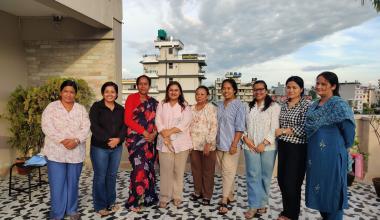
Cultivating Capacity for Change: Workshop in Nepal Advances Agroecological Food Systems
Read more
Standing Strong through Struggles – An Interview with Chhimi Dorji
Read more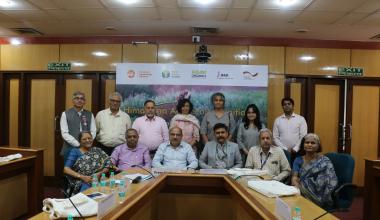
Himalayan Agroecology Initiative: Scientific Committee Convenes to Guide Indian Roadmap for Sustainable Food Systems
Read more
Himalayan Agroecology Consultations: Pioneering Sustainable Change in Nepal and Bhutan
Read more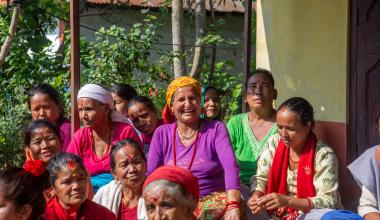
Digging Deeper Rising to challenges on the road(map) – Interview with Karishma Gurung
Read more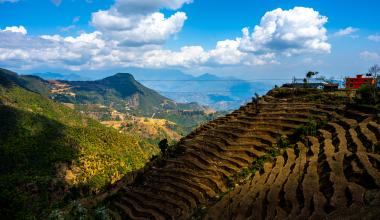
World Soil Day 2024: Why we Urgently Need to Stop Treating Soils like Dirt and Agroecology as a Niche?
Read more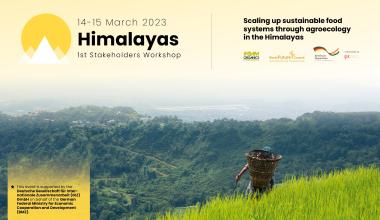
Workshop: Scaling up Agroecology in the Himalayas
Read moreContact us
In case of questions, comments or getting involved in the process, please don’t hesitate to contact us:
Ingrid Fritsche,
Project Manager Scaling up Agroecology,
World Future Council
Ingrid.fritsche@worldfuturecouncil.org
Madhur Gandhi,
Project Coordinator,
IFOAM - Organics International
m.gandhi@ifoam.bio
